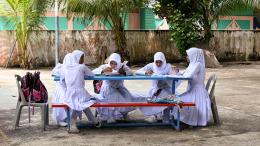The book presents case studies in Bangladesh, India, Indonesia, Tuvalu, and Viet Nam, examining specific and common vulnerabilities to climate change and related mobility. It shows that climate change threatens education both directly — through the destruction of schools and property – and indirectly, by forcing people to cross borders, ensuring neither legal residency nor the right to education. The book offers evidence-based recommendations for building national education systems that are resilient to the impacts of climate change and ready to ensure the minimum learning disruption for all ages during displacements.
Based on research conducted by UNU-IAS and UNESCO in 2021, the book is accompanied by publications on two other climate change “hotspots” — Latin America and South-Eastern Europe. These regional analyses will inform the development of a report with global policy recommendations.


